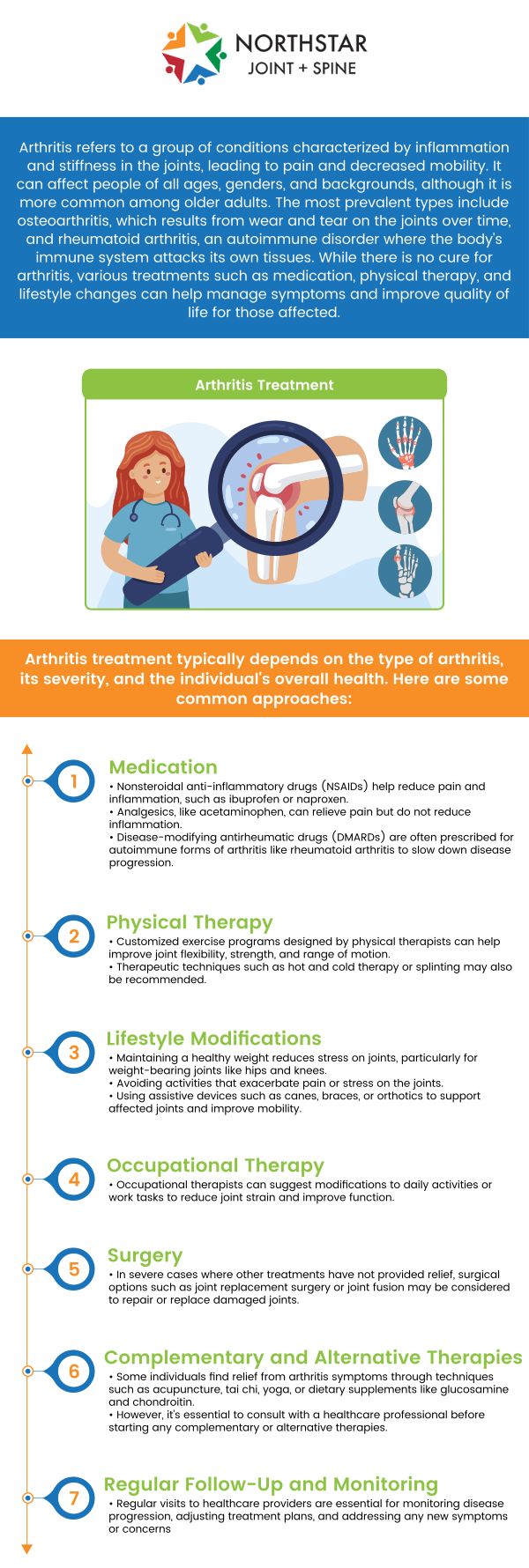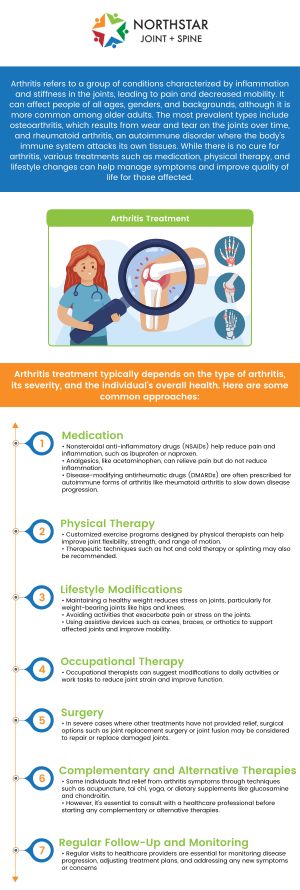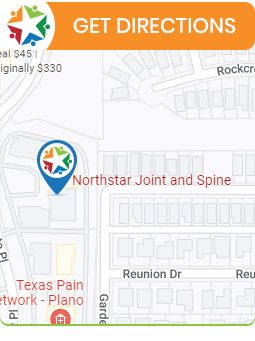Understanding the Causes and Symptoms of Arthritis
Arthritis is a condition that causes inflammation and pain in the joints. At Northstar Joint and Spine, Board Certified Dr. Robert J. Nocerini, MD, specializes in treating arthritis, including osteoarthritis and inflammatory conditions. Our team provides personalized treatments to reduce pain, improve joint function, and enhance mobility. For more information contact us or book an appointment. We are conveniently located at 7704 San Jacinto Pl Suite #200 Plano, TX 75024.




Table of Contents:
What is the main cause of arthritis?
At what age does arthritis usually start?
How is arthritis usually treated?
What type of doctor is best for arthritis?
Understanding the Causes and Symptoms of Arthritis with Dr. Robert Nocerini at Northstar Joint and Spine in Plano, TX
Arthritis is a common disorder that presents in many different ways. No matter what kind of arthritis you have though, your joints are always affected, with pain and inflammation being some of the most common symptoms that patients experience. While arthritis is common, without about 50 million people worldwide suffering from it, it’s also a complex issue that requires professional medical care to help manage.
Unfortunately, there is no singular cause when it comes to the different types of arthritis and the root cause of many types hasn’t yet been identified by the medical community. However, research has shown that possible causes may include:
• Having an abnormal metabolism.
• Genetic inheritance.
• Getting an infection.
• An immune system dysfunction.
Arthritis may be caused by any one of these factors and/or multiple factors working in combination with each other.
While arthritis is a condition that typically affects older adults, it can really start at any age. Men, women, and children can develop arthritis at any stage of life.
However, many people begin developing symptoms of arthritis between the ages of 40-60, though this is only a general range and won’t account for everyone.
Your age, lifestyle factors, genetics, sex, and weight can all affect your likelihood of developing arthritis.
Currently, there is no cure for arthritis. However, there are many different treatment options available to help you manage your condition. Which treatment option is best for you may vary depending on the type of arthritis you have, the severity of your condition, and your overall health.
Non-surgical treatment options for arthritis include:
• Medication. Such as anti-inflammatory, pain medications, and/or biologics.
• Physical therapy. To help improve strength in the joints, your range of motion and motility, and to lessen arthritic pain.
• Therapeutic injections. Cortisone shots and/or viscosupplementation may help temporarily alleviate pain and inflammation due to arthritis.
In some cases where your arthritis is severe and conservative treatments aren’t proving effective, your healthcare provider may recommend surgery. This may include fusion therapy, where two or more bones are merged to immobilize a joint and reduce pain, or a full and/or partial joint replacement where an artificial joint replaces the natural one to improve function, movement, and pain levels.
There are many different types of doctors that can help you manage the symptoms of your arthritis. The best one for you will vary depending on the severity of your condition, what treatment options you may need, and your overall health. This may include a:
• Primary care doctor. A primary care physician (PCP) can usually help treat arthritis in a very standardized way, via the use of anti-inflammatory medications, prescription drugs, and prescribed therapies. They will also order diagnostic testing to understand the full extent of your condition. If your symptoms don’t improve, or get worse, or it’s discovered that you have an underlying condition contributing to your arthritis, your doctor may refer you to an orthopaedist or a rheumatologist for more intense medical care.
• Orthopaedists. Orthopaedists are medical professionals that specialize in treating conditions that affect the musculoskeletal system, such as osteoarthritis. They will often perform treatments for more severe cases of arthritis, such as corticosteroids or hyaluronic acid injections. Orthopedic surgeons can also perform surgical procedures, such as joint replacements, for those suffering from severe arthritis.
• Rheumatologists. Rheumatologists are doctors that specialize in musculoskeletal diseases and autoimmune conditions. They are typically the most sought professionals when it comes to arthritis treatment as they treat all types, including osteoarthritis, rheumatoid arthritis, and psoriatic arthritis.
• Pain Management Physicians. Pain management physicians are a group of specialists with a higher level of training and experience than other primary care physicians because they diagnose and treat different types of acute and chronic pain encountered by their patients. Some things that pain management doctors do that other doctors don’t:
• Perform specialized tests to diagnose chronic pain in their patients
• Prescribe appropriate medication and administer it; These unique conditions should be monitored because the severity varies from patient to patient-
• Performing procedures including spinal injections and nerve blocks
• Coordinate any additional care their patients may require, including physical therapy, psychotherapy, and rehabilitation
If you have questions about arthritis treatment or would like to talk to a specialist, connect with us at Northstar Joint and Spine. Our medical team would be happy to support you in getting the care you need so that you can feel confident moving forward in your treatment.
Board-certified Dr. Robert Nocerini at Northstar Joint and Spine in Plano, TX, provides in-depth care to help patients understand the causes and symptoms of arthritis. Arthritis is a condition that affects the joints, leading to pain, swelling, and stiffness, often limiting mobility and impacting daily life. Dr. Nocerini conducts thorough evaluations to determine the type of arthritis and develop a customized treatment plan that targets pain and inflammation.
With expertise in diagnosing and managing arthritis, Dr. Nocerini educates patients on lifestyle changes, exercise, and treatment options to manage symptoms and slow disease progression. His holistic approach empowers patients to understand their condition and take proactive steps toward improving joint health, helping them regain comfort and mobility for a more active lifestyle.
For more information, contact us today or schedule an appointment to discover more. We are conveniently located at 7704 San Jacinto Pl Suite #200 Plano, TX 75024. We serve patients from Plano TX, Willow Bend TX, Frisco TX, Allen TX, Addison TX, North Dallas TX, and surrounding areas.

Check Out Our 5 Star Reviews


Additional Services You May Need
▸ Back Pain
▸ Shoulder Pain
▸ Chronic Pain
▸ Epidural Steroid Injections
▸ Spinal Cord Stimulation
▸ Viscosupplementation
▸ Genicular Nerve Blocks
▸ Facet Injections
▸ Joint Injections
▸ Sacroiliac Joint Injections
▸ Lumbar and Cervical
▸ Facet Medial Branch Blocks
▸ Diagnostic Nerve Blocks
▸ Medication Management
▸ Neck Pain Doctor
▸ Diabetic Peripheral Neuropathy
▸ Headaches
▸ Suboxone
▸ Botox for Migraines
▸ Peripheral Nerve Stimulation
▸ Spine
▸ Joints
▸ Muscles
▸ Bones

Additional Services You May Need
▸ Back Pain
▸ Shoulder Pain
▸ Chronic Pain
▸ Epidural Steroid Injections
▸ Spinal Cord Stimulation
▸ Viscosupplementation
▸ Genicular Nerve Blocks
▸ Facet Injections
▸ Joint Injections
▸ Sacroiliac Joint Injections
▸ Lumbar and Cervical
▸ Facet Medial Branch Blocks
▸ Diagnostic Nerve Blocks
▸ Medication Management
▸ Neck Pain Doctor
▸ Diabetic Peripheral Neuropathy
▸ Headaches
▸ Suboxone
▸ Botox for Migraines
▸ Peripheral Nerve Stimulation
▸ Spine
▸ Joints
▸ Muscles
▸ Bones






